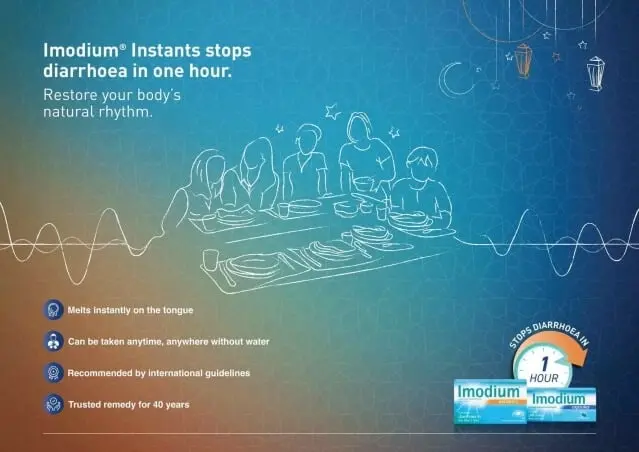Fasting is a universally famous practice that refers to abstaining from eating and drinking for a specific period. Fasting durations differ according to the reason behind it, be it health concerns or religious and spiritual beliefs. Muslims fast annually during daylight hours in the Islamic month of Ramadan. It also has a unique spiritual atmosphere, since it promotes family and friends union, self-discipline, tolerance and empathy.
Despite the spiritual and physical benefits that fasting yields, cases of stomach issues and gastrointestinal dysfunctions like indigestion, acid reflux, bloating and diarrhea are often prevalent in Ramadan.² These cases could affect both people who already struggle with gastric problems and those who don’t, and they are mainly due to unhealthy eating habits during Iftar (non-fasting) hours.
Suffering from Diarrhea in Ramadan
Diarrhea is a quite common health problem which can vary from a temporary and mild condition to a chronic and possibly health-threatening one. Diarrhea is passing looser or more frequent stools than is normal for you. Types of diarrhea include acute, persistent, chronic, and severe diarrhea.³ It usually results from a gastrointestinal infection that can arise due to bacterial or viral infections. As a result, nutrients move too quickly through the gastrointestinal tract, giving the body no time to absorb it before it exits and leading to loss of fluids.³
This condition could be even more debilitating and unbearable when a person is fasting. During fasting, diarrhea can cause dehydration, malabsorption, cramping, nausea and dizziness.
Causes of Diarrhea while Fasting
Diarrhea can result from hypersecretion of salts and water into the GI tract due to drinking highly caffeinated liquids. Consuming large amounts of fruit juices and smoothies that often contain large fructose portions, can also lead to diarrhea and bloating in some people. ⁴ Although fasting itself cannot cause diarrhea, the act of Iftar or breaking fast might include unhealthy habits that impact your bowel’s movement.² Here are some of the reasons and common mistakes that you can avoid to prevent diarrhea during Ramadan:
1. Overeating at Iftar :
May cause acidity, abdominal discomfort and gastritis. But in most cases, excessive eating at Iftar after fasting all day is what puts pressure on your stomach and leads to heartburn and other digestive issues. Also, with limited digestive enzymes due to fasting, excess food and liquids will disrupt the digestion process and cause discomfort.²
2. Eating abruptly after breaking fast :
It is crucial to break your fast gradually with small portions of food to give your digestive system enough time to adjust and function properly.⁵ Hence, it is preferred to break your fast with a snack first and a glass of water, then eat the main meal after Maghrib prayer.²
3. Consuming oily, fried or spicy food :
High in fat foods can slow down digestion and trigger acid reflux, while spicy food can irritate the stomach easily. Fats generally take longer to digest, which can leave you with nausea or diarrhea in some cases. So, it is safer to avoid deep-fried or spicy food that can aggravate the stomach and cause cramps.²
4. Other reasons :
Some other common causes of diarrhea are lactose intolerances, infections, allergic reactions, Crohn’s disease, IBS-D and poor diets.³
Acute Diarrhea Treatment
In mild or acute diarrhea cases, it is preferable to receive oral rehydration therapy (ORT) to treat or prevent dehydration and further complications.⁷ If pharmacological treatment is required, you can then use an antidiarrheal medication that contains Loperamide like IMODIUM®, to provide faster relief. Taking IMODIUM® enables your body to start absorbing fluids, salts, and nutrients as it normally would, helping restore the gut’s natural functions.⁶ Learn more about how IMODIUM® helps bring back the rhythm to your body so that you can dedicate more time to the valuable practices and family gatherings in the holy month of Ramadan.
Visit our FAQ section for more information about diarrhea and how IMODIUM® can help you manage it when fasting.
References
1. https://www.ncbi.nlm.nih.gov/pmc/articles/PMC4516560/
2. https://www.dietitians.org.my/health-info/minimise-stomach-upsets-during-ramadan
3. https://medlineplus.gov/diarrhea.html
4. https://www.health.harvard.edu/digestive-health/is-something-in-your-diet-causing-diarrhea
5. https://kingscollegehospitaldubai.com/digestive-health-during-ramadan/
6. https://www.nhs.uk/medicines/loperamide/
7. https://www.who.int/maternal_child_adolescent/documents/9241593180/en/
VG74146-20/05/2020



